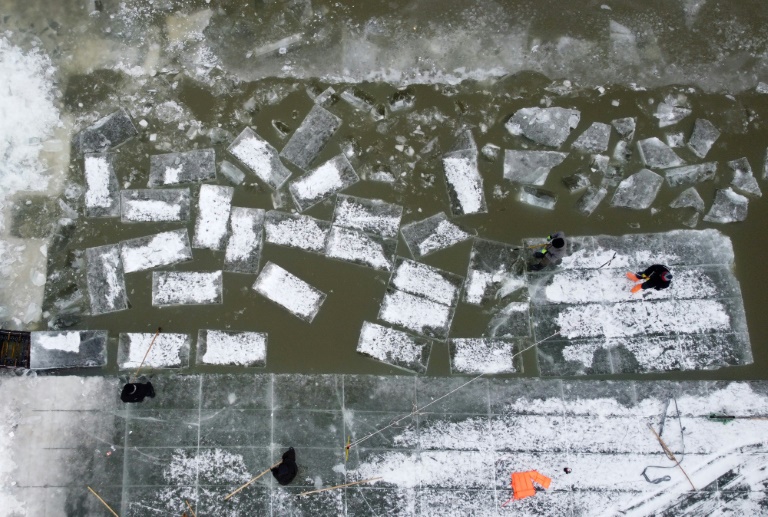Liu Yantao and six co-workers start toiling on a frozen river in northeast China before dawn, using hand tools and machines to carve large ice blocks for an annual winter sculpture festival.
Liu and his team are among more than 100 people who work on the Songhua River to harvest the 170,000 cubic metres of ice bricks needed this year — enough to fill 70 Olympic swimming pools.
Every year, a worker slips into the frigid water.
But that’s a risk farmers are willing to take to earn extra money during the harsh winter by harvesting the pieces used to make crystal palaces and sculptures at the Harbin Ice and Snow Festival.
Liu’s team cuts out 2,000 pieces of ice every day for about three weeks, arriving before sunrise and leaving after sunset.
The farmers, who grow corn and soybeans the rest of the year, get paid 2.5 yuan ($0.35) for each of the 1.6-metre-long, 400-kilo (5-foot long, 900-pound) rectangles of ice they produce for the festival, which will open before the New Year.
They each make around 500 yuan per day. “There’s nothing to do in the winter. People play mahjong at home. I don’t like gambling, so I work,” says Liu, a 36-year-old father of one.
Read Also: Impeachment: Pray For Me – President Trump Cries Out
“Prices of everything are going up. I make a little more money to make life easier,” says the chain-smoking farmer.
– ‘No one has really drowned’ –
 AFP / NOEL CELISWorkers use a large motorised saw to cut the icy surface into 220-metre-long, 190-metre wide grids
AFP / NOEL CELISWorkers use a large motorised saw to cut the icy surface into 220-metre-long, 190-metre wide gridsLiu has been mining ice for more than a decade. He is the team leader among a group of farmers who drive from Harbin’s countryside to arrive at the river before 5:00 am every morning.
Resembling farmers ploughing a field, they use a large motorised saw to cut the icy surface into 220-metre-long, 190-metre wide grids — bigger than two football fields.
They slice the area into rectangles until the surface looks like a bar of ice chocolate.
Then, using large picks, the seven workers rhythmically stab at the ice down the line to separate the enormous block from the rest of the frozen river.
One by one, the crystal bricks are lifted onto a conveyor belt and picked up by a forklift that takes them to waiting trucks.
The workers don’t talk much during the day but they can see their breath when they open their mouths in the -18 degrees Celsius (0 Fahrenheit) weather.
 AFP / NOEL CELISEven their lunch comes from the river: The workers throw nets in the water to catch some carp
AFP / NOEL CELISEven their lunch comes from the river: The workers throw nets in the water to catch some carpThey stand at the edge of ice holes several metres deep. Even forklifts have fallen in the river in the past. Orange life-jackets are nearby but nobody wears them.
“If you fall down, you will be pulled out by your companions,” Liu says, lighting up yet another cigarette.
Read Also: Impeachment: Pray For Me – President Trump Cries Out
“And the rope is tied to the ice drill. If anyone falls off, we will throw the rope to him. No one has really drowned.”
– Proud tradition –
Liu Zhiwen, a farmer who has been harvesting ice for 20 years, doesn’t cut ice anymore.
He brought the conveyor belt about seven years ago and his machine now does the work of three farmers.
 AFP / NOEL CELISMost ice diggers don’t even go to the ice festival, which is just a few minutes away from the river
AFP / NOEL CELISMost ice diggers don’t even go to the ice festival, which is just a few minutes away from the river“Only farmers take this job, why are farmers always slaving away? I can’t believe it,” said Liu Zhiwen, who watches the work being done from the warm comfort of his car.
Liu Yantao’s team took their first break around 11:00 am — after having already worked for seven hours.
Even their lunch comes from the river: The workers throw nets in the water to catch some carp. They cook and eat the braised fish right on the ice with steamed bread, sitting around the stove. A few downed some liquor to stave off the bitter cold.
Twenty minutes later, they’re back on the ice and will only finish their work after dark — a 12-hour day.
Despite slaving away on the frozen river, like most ice diggers Liu doesn’t even go to the ice festival, which is just a few minutes away from the river.
Admission is 290 yuan — more than a half-day’s wages — so he’ll just watch it on television, proud of the work he has done.
“There are years of tradition in building an ice scene in my hometown,” Liu says. “If I don’t do it, I will feel lost.”
AFP NEWS

